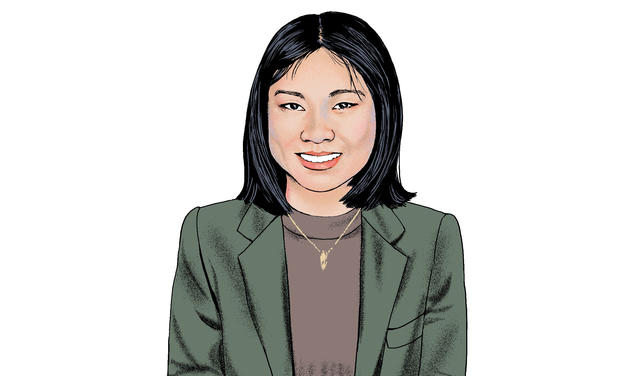More than 700 people braved driving wind and rain Nov. 17 and packed into the ballroom at the historic Fairmont Copley Plaza in Boston to welcome President Eisgruber ’83 on the 16th stop of his “welcome tour” since becoming Princeton’s 20th president in 2013.
Following a lively cocktail hour, alums settled in for a discussion moderated by Princeton trustee Brent Henry ’69. After getting Eisgruber to admit that students have been known to chant, “Ice Ice, Gruber!” in his presence, Henry’s questions touched upon Eisgruber’s arrival on the faculty at Princeton, his decision to accept the Princeton presidency after turning down several other such offers, his plans for the future, and the state of Princeton admissions.
Eisgruber, who was a clerk for Supreme Court Justice John Paul Stevens, said his own passion for constitutional law was ignited at Princeton in Professor Walter Murphy’s constitutional-law class. After teaching at NYU for more than a decade, Eisgruber jumped at the chance to teach law and public affairs on the undergraduate level. After all, because Princeton had no law school, “I thought I had insulated my career from academic administration,” he laughed. Eisgruber said he could not imagine becoming a university president except at a place where you “can feel the music of the place and sing the songs of the place.”
Eisgruber told the crowd he hopes he will be remembered for promoting three priorities: service, access, and excellence. “To be on the Princeton campus is a gift, and with that gift comes the responsibility to give back,” he said, explaining his desire to sharpen the University’s focus on service. To increase access to the gifts that Princeton offers, Eisgruber defended the University’s decision to expand the student body by 10 percent, adding approximately 125 students to each class, and with that expansion, to expand socioeconomic access as well. Eisgruber drew applause from the crowd when he mentioned that 75 percent of Princeton students graduate with no debt and the other 25 percent graduate with, on average, $5,500 in loans.
Increasing Princeton’s international presence is another priority, Eisgruber said. Henry asked how Princeton can compete with Harvard and Yale, which have a large percentage of international students attending their professional schools, as well as international campuses. Eisgruber pointed out that 11 to 12 percent of the current undergraduate student body is international (on par with both Harvard’s and Yale’s ratios) and that eight years ago, 32 percent of students spent four or more weeks abroad, but that number has increased to 60 percent. In addition his plans to visit Asia once a year during his presidency, Eisgruber said that a small office is being opened in Beijing to facilitate the “networks and flow of students across international boundaries.”
But just who are Princeton students these days? “What’s the biggest admissions myth you’d like to bust?” Henry asked. Eisgruber was emphatic that the Princeton student has never been the stereotypical “math Olympian.” The students Princeton admits, he said, continue to be those who combine different levels of academic mastery with different levels of engagement in athletics, government, and the arts. What has changed in terms of admissions, he said, is the size of the pool. This elicited a question from an alumnus about alumni relations at a time when, because of this increased pool, fewer children of alumni are being accepted.
“Princeton does have a special relationship with alumni, and we should recognize that,” Eisgruber said. He said that Princeton gives children of alumni the “benefit of the doubt” in “tiebreaker” situations and that the admit rate for legacy applicants is 30 percent — or about four times as high as the general pool — and those 30 percent have the same academic credentials as other admits. Eisgruber acknowledged that this still can be a disappointing process for alumni and noted that the University is adding staff to better communicate with alumni families who have children applying.










0 Responses